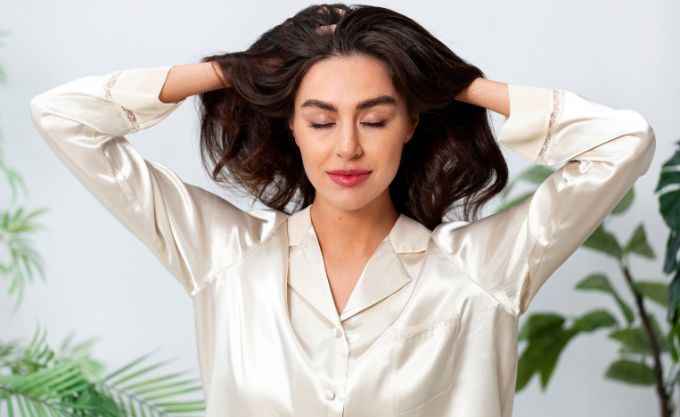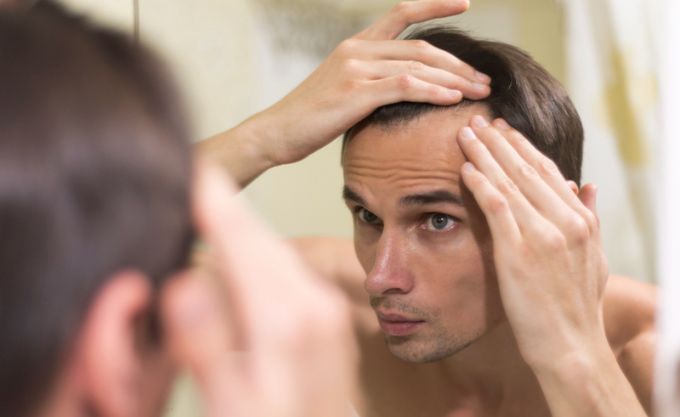7 Scientific Hair Growth Tips for Stronger and Healthier Hair
- Written by Vivek Khullar
- Jun 21, 2024
- |
- 16 min read
 Listen to the full text
Listen to the full textHave you ever wondered if there are scientific ways to grow stronger, healthier hair? You are not alone! Millions of people use scientific hair loss recovery techniques to gain back a full head of hair.
From understanding the weather to choosing the best workout, we rely on science for everything. No wonder, both men and women experiencing hair thinning and loss are also preferring medically proven ways to gain back hair.
In this blog, Lordhair - top supplier of toupee hair replacement systems - will unveil 7 science-backed tips to give your hair the boost it craves.
What are Scientific Hair Growth Tips and Ideas?
At Lordhair, we believe in science-backed methods for healthy hair growth and risk-free recovery through toupees if hair loss is too aggressive. Here are some key scientific findings that support effective hair growth strategies:
1 Keep your scalp clean
They say washing your hair too much can hinder its growth. That might be true but science has proven that a clean scalp promotes hair growth and health. Here’s the science behind it:
Our scalp naturally produces sebum. For those who don’t know, it’s an oily substance that keeps the hair hydrated. However, excess sebum buildup can clog hair follicles. Hindering their ability to produce new strands.
Daily washing with a gentle shampoo helps remove excess sebum, dirt, and product buildup. It creates a clean and healthy environment for hair growth. This promotes optimal blood circulation to the scalp. Meaning, essential nutrients and oxygen get delivered easily. Additionally, daily washing removes dead skin cells that can accumulate on the scalp and potentially block the follicles.
However, it is important to strike a balance. Overwashing, especially using regular shampoo, can strip the scalp of its natural oils, leading to dryness and irritation. Use a gentle shampoo formulated for daily use. If your hair and scalp are sensitive, speak with your doctor for product recommendations.

2 Choose right hair cosmetics
Keeping your scalp clean is a great first step but do you know that the right hair care products can truly elevate your hair growth journey? Yes, it's a science-based fact and backed by the National Center of Biotechnology Information! Many conventional hair cosmetics contain ingredients like parabens and sulfates which can strip your hair of its natural oils. Result? Dryness, breakage, and hair growth inhibition.
Opt for gentle, sulfate-free shampoos and conditioners that cleanse without stripping the scalp of its moisture. You must be wondering, “What ingredients should I look for when selecting the right cosmetics?” Well, here are some science-backed ingredients that promote strong, thick hair on the scalp:
Blood flow boosters: Look for products containing niacin (vitamin B3), vitamin B complex, ascorbic, acid (vitamin C), tocopherol (vitamin E), grape seed extract, or rosemary oil.
Targeted ingredients: Science offers a plethora of targeted ingredients for specific hair concerns. Biotin (vitamin B7) helps your body produce keratin (a protein important for strong and healthy hair). Experiencing female hair loss? Polyphenols can block excess androgen that contributes to hair loss in your case.
3 Regular scalp massage
Most of us know that stress can trigger hair fall. Regular scalp massage can be a powerful tool for promoting hair growth, and scientific research backs this up! Scientific studies suggest that it can bring down the level of stress hormones like cortisol.
But the benefits go beyond stress relief. Scalp massage has been shown to improve blood flow to the scalp. Dermatologists also say that it stimulates specialized cells near the follicles which also promote thicker and fuller hair growth.
Here’s the study of a 2019 scientific survey. It found that participants who received regular 20-minute scalp massage experienced significant hair growth as well as reduced hair loss. So, incorporate scalp massage into your routine. See the science of touch translate into luscious locks!
4 Brushing with TLC
Okay, this one is a no-brainer for women! Brushing your hair regularly massively improves hair health by detangling strands, preventing breakage, and even boosting the growth of healthy hair on the scalp. Here’s the science behind it: Daily brushing distributes your scalp’s natural oils. It creates a healthy shine and coats your hair for protection.
The key is gentle brushing with the right tools. Opt for a wide-toothed comb or a soft boar bristle brush. Start at the ends of your strands. Work your way up to the roots to avoid unnecessary tugging. Wet hair? STOP! Brushing it can cause breakage so wait until it’s at least half dry before brushing.
Here’s a bonus tip: Try brushing upside down. This can further improve blood flow to the scalp, potentially boosting hair growth. Remember, gentle brushing is key to healthy, thriving strands.
5 Use hair-growth medications
Although many hair loss products make bold claims, only a few have scientific backing. Good news? The Food and Drug Administration (FDA) has approved two medications that show promise in treating thinning and baldness in men and women - finasteride and minoxidil.
Finasteride specifically targets male pattern baldness. This medication works by reducing the levels of DHT hormones. Studies have shown that finasteride can significantly increase the total number of hair on the scalp after just 2 months of use. While this medication might be effective and safe for FPHL in women without hyperandrogenism, pregnant females are still advised to keep away from it.
Next up, we have minoxidil. A topical solution that can be applied directly to the scalp. Although the exact mechanism isn’t fully understood, research suggests that it helps hair growth by potentially increasing the diameter of blood vessels in the scalp. This translates to improved delivery speed of essential nutrients to hair follicles. Basically, promotion of thicker and denser hair growth!
A year-long study also found that 97% of men using minoxidil witnessed either improved hair growth or halted hair loss progression. It is important to note that these medications work best when used consistently. Also, these may not be suitable for everyone. Consult a dermatologist to determine if these options are right fit for your specific needs.
6 Try low-level laser therapy
Beyond traditional medications, low-level laser therapy (LLLT) has emerged as a potential scientific tool for hair growth in men and women. According to dermatologists, this therapy involves using low-energy lasers to irradiate the scalp. Research suggests that LLLT causes hair to grow by stimulating cellular activity in hair follicles.
Studies have also shown it can increase density and thickness in those with androgenetic alopecia. While more research is ongoing, we can say that low-level laser therapy presents a promising avenue for those seeking science-backed solutions for overcoming hair loss!
7 Take Omega-3 and 6 supplements
Our list will be considered incomplete without discussing this scientific hair growth tip! Omega-3 and 6 fatty acids are nutrients that can play a vital role in overall health. Research suggests that they may also benefit hair growth. How, you ask? They are thought to promote scalp health and growth by reducing inflammation and supporting healthy blood circulation in the head.
In simple words, Omega-3 and 6 fatty acids create an environment conducive to hair follicle function. This will potentially promote thicker, stronger strands. While more studies are needed to fully understand the extent of their impact, we can say that incorporating omega-3 and 6 fatty acids into your diet or through supplements can be a valuable addition to your hair growth strategy.
These were some scientifically proven ways to improve hair health and recover from hair loss. If you are losing a lot of hair lately, it’s important to learn about the popular reasons behind hair damage.
So, let’s also explore the reasons behind hair loss in both men and women.
What Causes Hair Loss in Men and Women?
Hair loss can be a frustrating experience. It often makes people anxious, and brings up questions like, “What’s causing hair loss on my scalp?” To be fair, there are many reasons why hair fall occurs. Understanding them can be the first step towards addressing the issue.
Here are some most common culprits behind hair loss on the scalp:
1 Hereditary hair loss
You must have heard about that saying, “Blame it on your genes.”Well, hereditary hair loss is all about it! The most prevalent culprit behind hair loss in men and women, it often manifests as male pattern baldness in men with a receding hairline and thinning at the crown.
Women may experience a more general thinning across the entire scalp. While genetics play a major role, some scientific findings by dermatologists state that factors like stress and hormonal changes can influence the onset and severity of hereditary hair fall.
2 Fungal infection
Fungal infections like ringworm can disrupt the hair growth pattern on the scalp. It irritates the scalp which leads to inflammation and sometimes even scarring. The inflamed and scarred areas can damage the hair follicles, hindering the ability to produce new hair growth.
Ringworm can be characterized by itchy, red, and scaly patches on the scalp. Need more hints? These symptoms are often accompanied by the thinning in those specific infected areas.
3 Tight hairstyles
Okay, some people, especially women, love wearing hairstyles like tight braids, cornrows, extensions, and high ponytails. While these may make you look amazing, they put constant tension on your hair. This can lead to traction alopecia - a type of hair loss that occurs in the areas where strands experience the most pulling force. Constant pulling can weaken the hair follicles over time. It causes them to eventually stop producing hair altogether.

4 Chemical damage
Ah yes, chemical processing… A common part of many hairstyling routines. Well, it can also weaken and damage your hair, making it more prone to breakage and falling out. Perms, relaxers, bleach - all are culprits in this category. Yes, you read it right! These harsh chemicals disrupt strands’ natural structure. It can leave them dry, brittle, and susceptible to snapping.
Repeated exposure to these chemicals can lead to significant hair fall. So, scientific hair growth experts recommend staying away from chemicals if hair health is important to you.
5 Hormonal shifts
One of the most common causes of hair fall in men and women. Before we talk about scientific facts to overcome it, let us tell you that hormonal fluctuations throughout life (triggered by life events like pregnancy, childbirth, menopause; even by taking certain birth control medications) can disrupt the hair growth cycle.
These hormonal changes can push more hair into the telogen (shedding) phase, thus leading to temporary hair fall. In most cases, hair growth resumes once the hormonal levels stabilize. But in others, it simply doesn’t!
Make sure to check out these sources as well afterward:
Everything about v-balding and hair loss
M-shape hairline in males and females
Hormones that cause hair loss
Genetic hair loss: Everything covered
6 Medical treatments
Do you know that certain medical treatments - like chemotherapy - can cause widespread hair loss in men and women? Yes, some dermatologists state that chemotherapy drugs target rapidly dividing cells. Unfortunately, hair follicles fall under this category.
This type of hair loss is usually temporary. Meaning, strands typically regrow after treatment is complete. However, it is important to note that specific effects of radiation therapies on hair loss can vary depending on the medication type and dosage used.
7 Nutritional deficiencies
Ah, yes. The body’s silent cry! A human body relies on precise nutrients to maintain healthy hair growth as well as the scalp. Deficiencies in certain vitamins and minerals can contribute to hair thinning and loss. Iron, protein, biotin, and zinc are all essential players in hair growth.
How, you ask? Okay, iron deficiency, for instance, can limit the flow of oxygen to hair follicles. Hindering the ability to produce hair. Similarly, protein deficiency can disrupt hair growth cycle as protein is the building block of hair.
Note: If you suspect a nutritional deficiency is contributing to your hair loss on the scalp, consulting a doctor for a blood test and discussing dietary adjustments can be beneficial! This is a scientific hair growth tactic!
8 Stressful events
Severe stress can trigger a temporary form of hair loss. For those who don’t know, it is called telogen effluvium. This usually manifests a few months after a stressful event. For instance, undergoing surgery, major life change, or losing a loved one. During telogen effluvium, more hair follicles than usual enter the shedding phase. This results in increased hair fall.
But as we said, it’s temporary. Meaning, hair growth usually resumes once the stress subsides. However, if you’re experiencing chronic stress; or hair loss persists for an extended period, consult a therapist as well as a dermatologist. There’s ample science behind this!
9 Thyroid disease
Surprised? We don’t blame you. Both overactive and underactive thyroid can indeed manipulate different phases of hair growth, eventually leading to hair loss. See, our thyroid gland regulates many bodily functions. This also includes hair growth.
When the thyroid is not functioning properly, it can disrupt peace among hormones, causing imbalances that affect the hair growth cycle. Hair loss caused by thyroid disease might be accompanied by other symptoms like fatigue, weight changes, and mood swings.

Scientific Hair Growth Tips: Final Words
Above are reasons and science-backed tips for making your hair thicker and healthy. By incorporating these strategies into your routine, you can create a hair growth-friendly environment and nurture your locks from inside out. Remember, consistency is key! Patience and dedication are crucial for seeing good results.
However, it is also important to acknowledge that these methods may not work for everyone. If you’ve explored these strategies and still seek a solution, Lordhair can help. We offer top-of-the-line, undetectable non surgical hair replacement that are crafted with the finest materials. They ensure a natural look and unmatched comfort.
Do you have any queries regarding our men's human hair wigs? Contact us today and have them answered by our experts!


